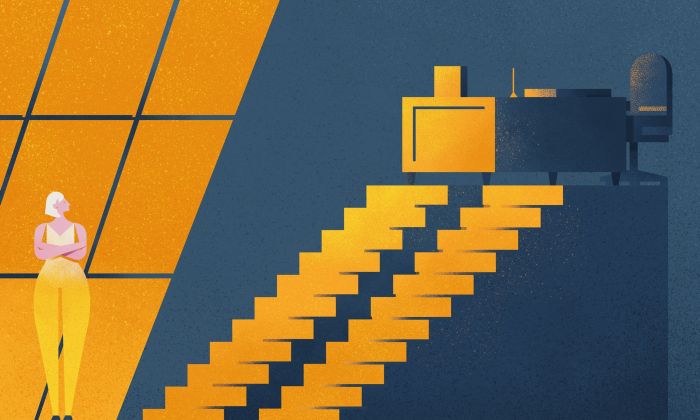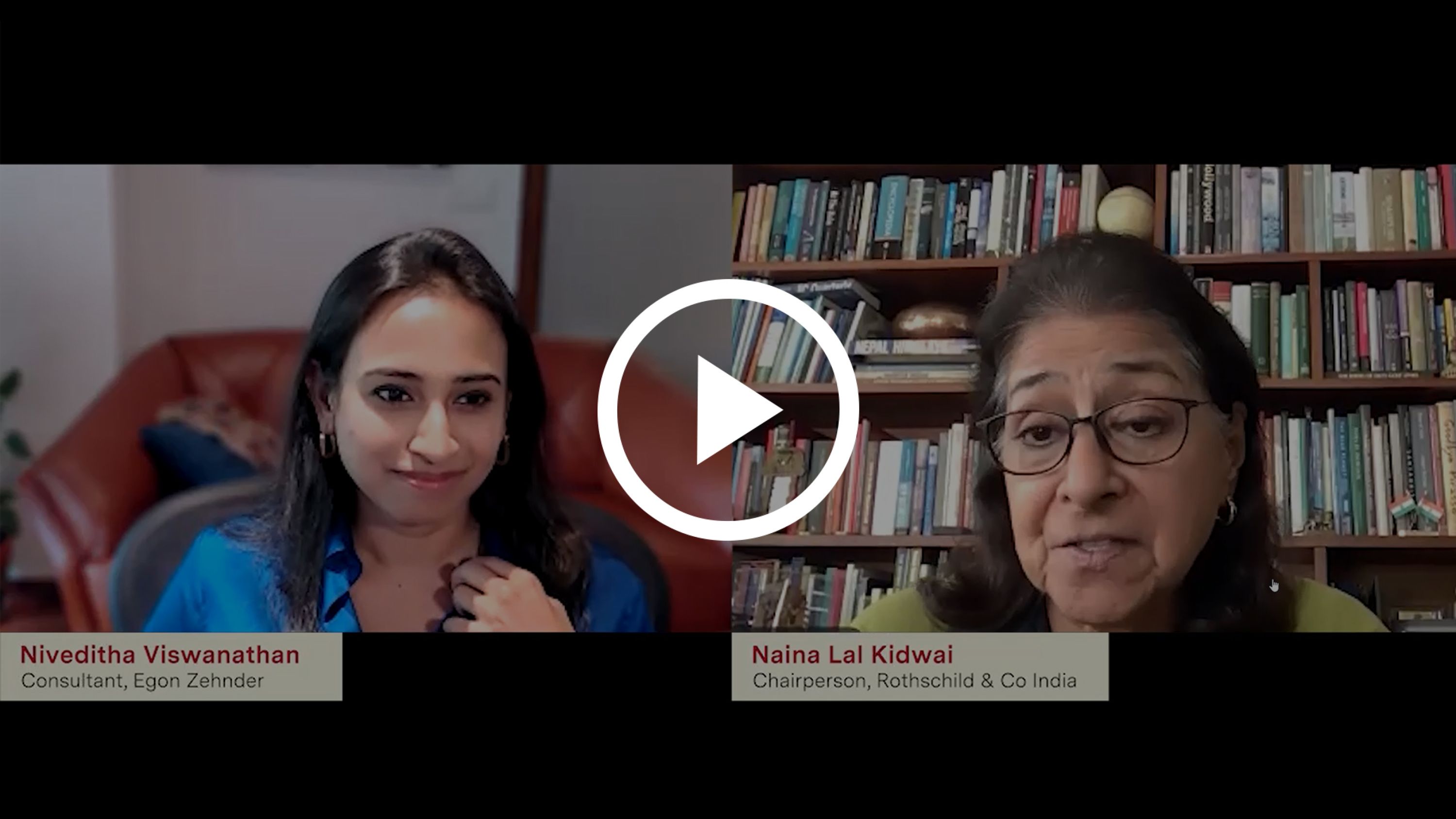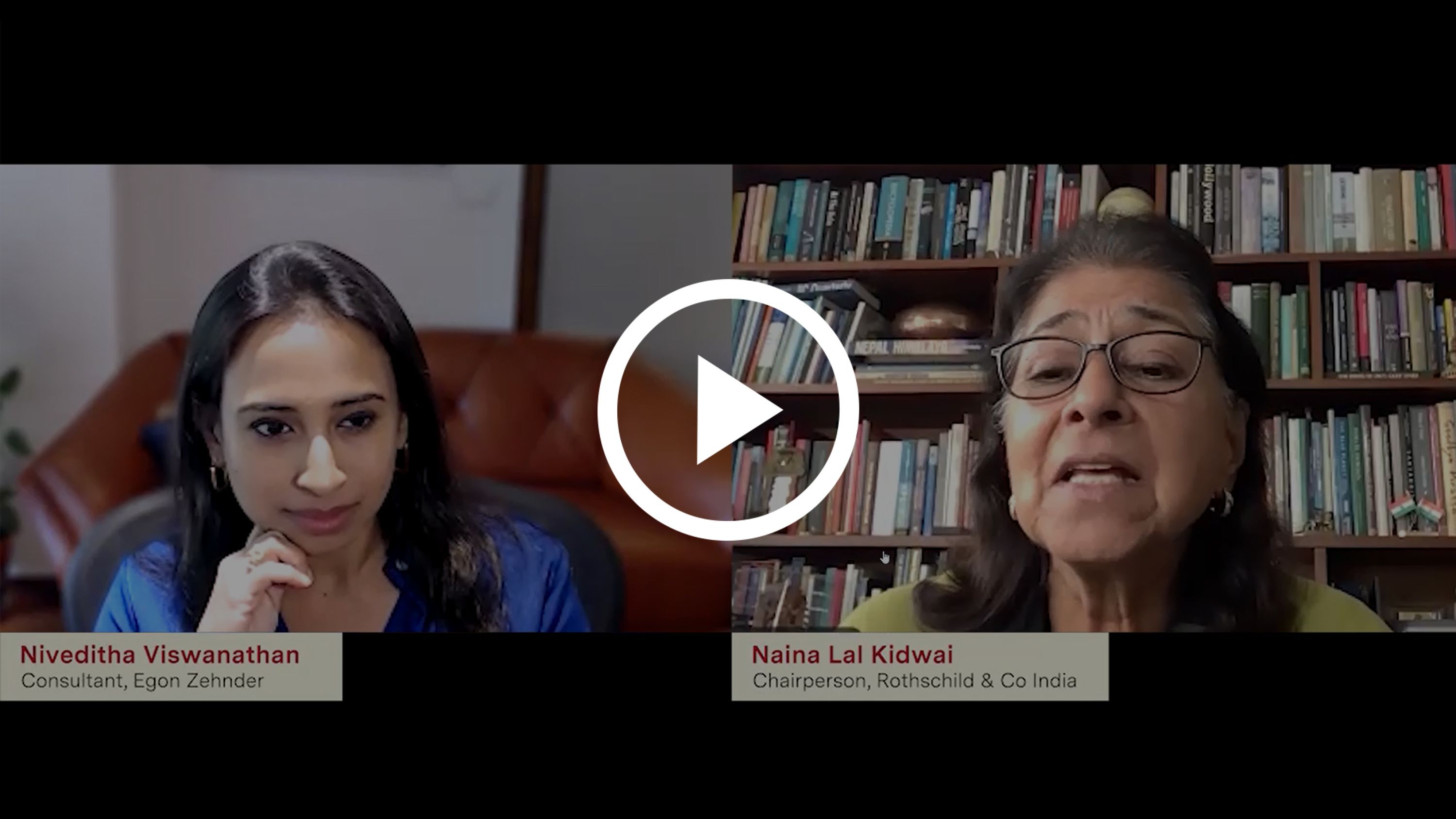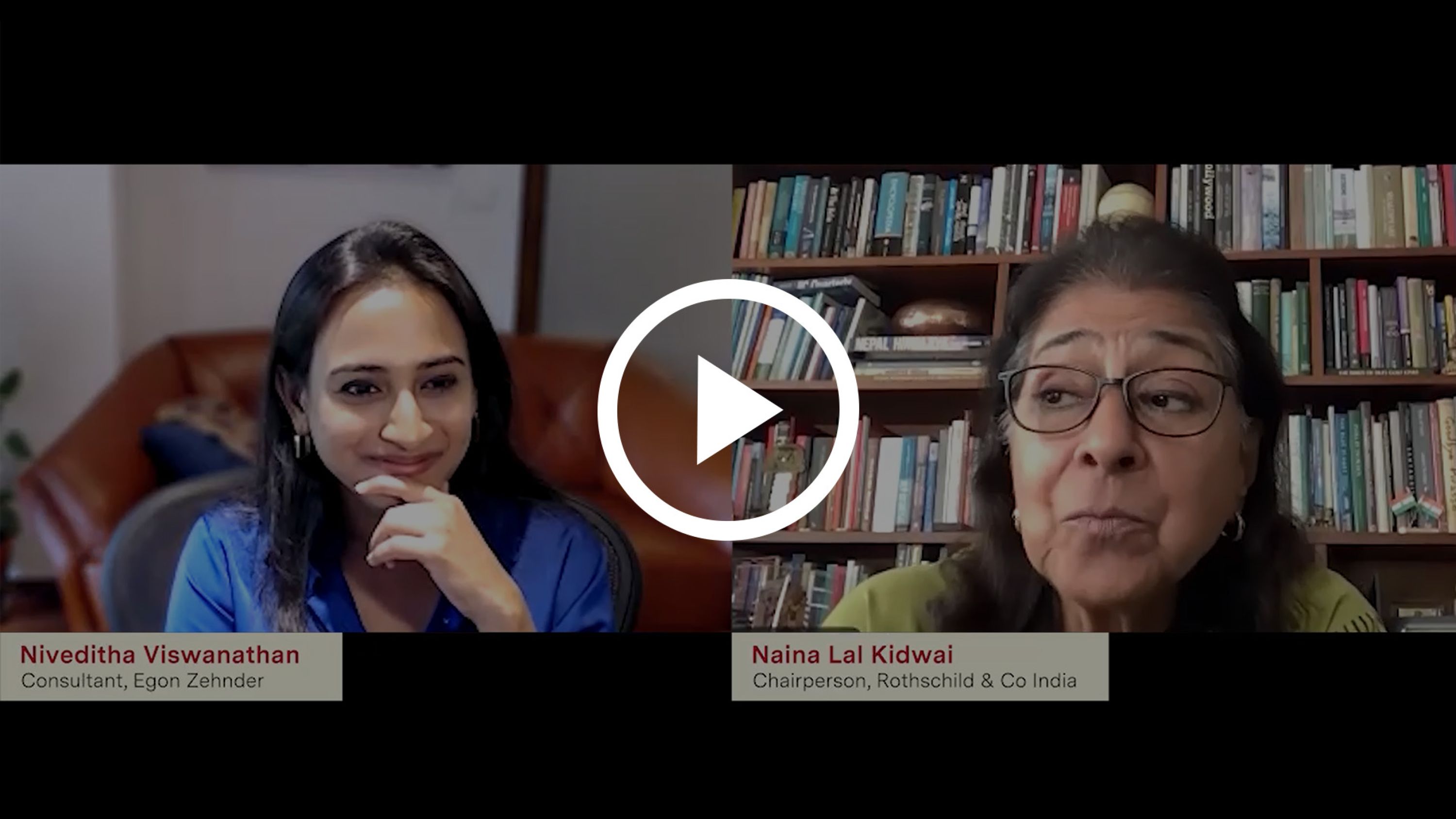Editor's Note: This interview is part of the Blazing a Trail: Women in Leadership series
In a career defined by pioneering milestones and quiet revolutions, Naina Lal Kidwai has consistently broken barriers while remaining grounded in purpose. As Chairperson of Rothschild & Co India and a senior advisor to global investment and climate-focused firms, her influence spans finance, sustainability, and policy. From being the first Indian woman at Harvard Business School to leading HSBC India through turbulent times, Kidwai’s journey is a masterclass in resilience, intuition, and impact.
In this candid conversation, Naina reflects on the formative moments of her childhood, the serendipity behind her many “firsts,” and the values that have shaped her leadership. With warmth and wisdom, she shares insights on navigating career crossroads, building inclusive teams, and balancing ambition with family — offering a rare glimpse into the life of one of India’s most respected business leaders.
Niveditha Viswanathan: What were some pivotal moments from your childhood that have had a lasting influence on who you are today?
Naina Lal Kidwai: It is interesting that some of the very early influences, seemingly small, can at times have a long-lasting impact. I think the leadership roles I was given very early on—like being class prefect, school captain, enabled my election as president of my college - and the realisation that I enjoyed leadership roles. Also playing in the basketball school team, debates, dramatics were all activities that really shaped me. I remember learning quickly that being bossy didn’t work - it made me unpopular. So, finding the right balance and figuring out my way has stayed with me.
My father’s influence was also profound. I was extremely competitive — if I didn’t come first in class, I felt crushed. But he would say, “I don’t care whether you come first or third. I only want to know that you did your best.” That completely changed how I viewed success. I began to compete with myself, not with others. It helped me retain my drive without becoming bitter or aggressive. I was lucky to have that grounding — from a father who was revered as a leader and a mother who was deeply spiritual.
Niveditha Viswanathan: You’ve had many ‘firsts’ in your career. Were those intentional or serendipitous?
Naina Lal Kidwai: Definitely serendipitous! I didn’t ever aim to be a ‘first’ in anything. When I joined Harvard Business School, it was only a month later that I found out I was the first Indian woman to go to HBS. I didn’t go in with that awareness or that preset goal.
When I wanted to do an MBA, my father said, “You can go, but only if it’s one of the best schools.” That taught me to not lower the bar – the standard was set for me — and I’m grateful for it. So, many of the firsts were perhaps an outcome and not a need to be a first of its kind – an output by focusing on doing my best.
I did have to ensure I was not a pushover when it came to being picked to head the investment bank at Grindlays Bank in 1987 as others vied for the role. That, in turn, helped to ensure that I was the Head of Investment Banking at Morgan Stanley way back in 1992. Later, in 2006, I did have to navigate my path to becoming the CEO of HSBC bank and then the Chair of all the HSBC entities in India. These were typical career negotiation and performance-based paths – not driven by a desire to be the first woman to do it! But also it involved not being afraid to say yes when the opportunity presented itself as when I was asked by FICCI to stand for election as Vice President and then President of the chamber – their first woman President in 86 years.
Niveditha Viswanathan: You seem quite happy with your decision to return to India – is that something you met with ease or resistance?
Naina Lal Kidwai: I anchored my aspirations around what I wanted to do and where I wanted to build my career. And it significantly depends on the field. If you’re in deeptech, you probably need to be in Silicon Valley. But in investment banking, like I was, the experience in India is more relevant for a career here. The U.S. is a different and mature market.
For me, it was also practical. The Indian job market was very hierarchical back then. Lateral movement wasn’t an option. So, while Manhattan was exciting with the options I had in hand, I knew that if I stayed longer, I would come back to India and be junior to my peers when I eventually returned. That made the decision clear — I had to come back and start, to work my way up here.
Niveditha Viswanathan: How did you deal with the naysayers in the early days of your career?
Naina Lal Kidwai: My anger at the naysayers helped drive my resolve to show them how wrong they were. This pushed me to work harder and better and to aspire to bigger roles.
Having good advisors and mentors to turn to, who are senior and more experienced helped at the beginning. And then I learnt that I don’t have to have all the answers. I made it a point to assemble the best teams, to seek out information, build networks, and look outside. That curiosity and willingness to learn were crucial – it brought people in versus keeping them out. And then things built from there. and standing in for me as we both navigated our careers. My bond with my sister, our kids – these are the most precious gifts.
Niveditha Viswanathan: You built a strong career while raising a family, in an era with fewer support systems. What were the advantages and disadvantages?
Naina Lal Kidwai: The disadvantages were stark. Maternity leave was 60-90 days then, there were fewer women in the workforce and therefore not as much agency as we currently witness. In many cases, I stuck out as the only woman in the room or among the very few.
But on the home front, I had the family ecosystem to support me – my mother and mother-in-law to help. That kind of family support was a huge advantage. Today, even though there are more facilities, that close-knit family unit is harder to find.
What’s better now is that there are more women in the workforce. And as more women go through their careers, make their voices heard, things begin to change. Women providing inputs and having these conversations do drive change. There are also more women in leadership roles – that also helps bring additional perspective to the larger organization.
Niveditha Viswanathan: Where did you draw strength from, when you have had to lead through unprecedented events and in moments of crisis?
Naina Lal Kidwai: During the 2008 Mumbai terror attacks, I was the CEO of HSBC. We had 32 HSBC employees stuck in the two hotels. The team was in uncharted territory – we had to take decisions, and the buck stopped with me.
What helped was a strong sense of ownership and intuition. I had read somewhere that intuition is just hundreds of experiences blended; and that gave me confidence to trust my gut. I had been in tough situations before, and I leaned on that experience.
What also helped was the trusted network of resources – the experts and advisors – I could access, who guided and helped me navigate the situation. They took my calls and they stepped in when we needed them.
Niveditha Viswanathan: How has the chapter after your executive career been?
Naina Lal Kidwai: I am still very engaged in a portfolio of boards and advisory work primarily in private equity and investment banking – which ties back to my love for investment banking and M&A. I now have more time for my not-for-profit work in the NGO I founded and Chair, the India Sanitation Coalition which works in sanitation, re-use of treated water and more recently plastic waste management. I’m doing everything I ever wanted to do and I work a full day and weekends!
Niveditha Viswanathan: Looking back, what are you most proud of?
Naina Lal Kidwai: The relationships I’ve built. Many of my former colleagues are still in touch and reach out. It’s especially lovely when the women I have interacted with come together — we laugh, we reminisce and support each other – it is heartwarming.
I’m proud of my family. Despite the guilt of not always being available, I’m happy with how things turned out. I always tell women: don’t give up your family for work, and don’t give up work for family. It’s hard, but it works out. Those bonds become your strength when things go wrong at work.
My husband Rashid’s unrelenting support – moving cities and standing in for me as we both navigated our careers. My bond with my sister, our kids – these are the most precious gifts.
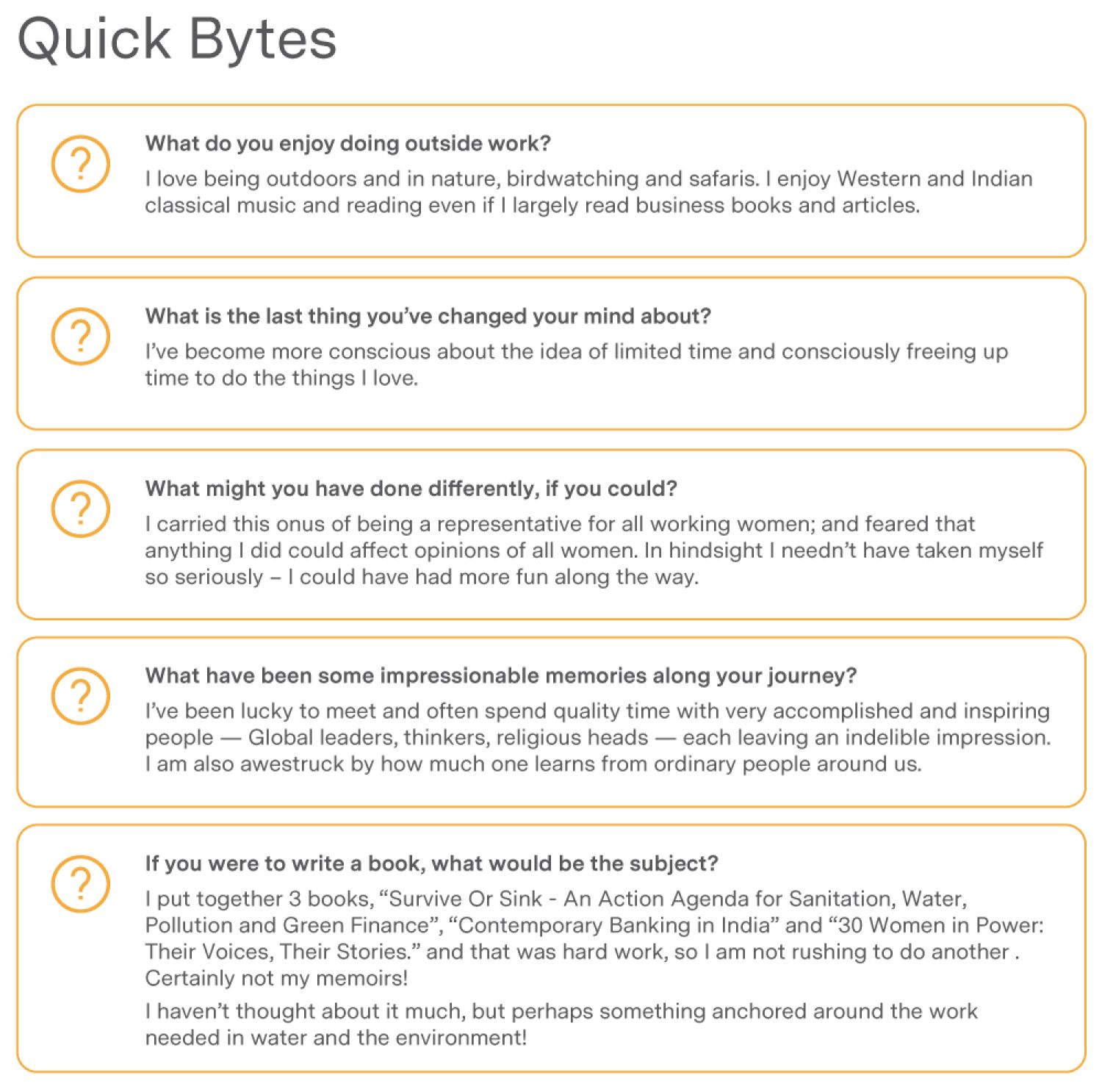
About Naina Lal Kidwai
About Naina Lal Kidwai
Naina Lal Kidwai is Chairman Rothschild & Co India, Senior Advisor Advent Private Equity, Senior Advisor TPG Rise Climate and Venture Advisor Lightspeed Venture Partners, India. She is a Non Executive Director on the boards of Holcim, Gland Pharma, UPL and Biocon and Past President of FICCI (Federation of Indian Chambers of Commerce & Industry). She retired in December 2015 as Executive Director on the board of HSBC Asia Pacific and Chairman HSBC India and in April 2018 from the global board of Nestle.
She is a member of the INDO-ASEAN Business Council, Army Group Insurance Fund’s investment advisory committee, Harvard Business School’s South Asia Advisory Board and Standard Chartered Bank’s International Advisory Council.
An MBA from Harvard Business School, she is the recipient of several awards and honours including the Padma Shri for her contribution to Trade and industry. She is engaged with institutions in environment, water and sanitation and has authored 3 books including the bestsellers “30 women in Power: Their Voices, Their Stories” and “Survive Or Sink: An Action Agenda for Sanitation, Water, Pollution, and Green Finance”.
She chaired the Primary Markets Advisory Committee of SEBI and has been a member of the Government of India’s Industry Task Force, the Prime Minister’s Trade and Industry Council, the National Manufacturing Council, the National Trade Council, the Working Group on Banking, Financial Sector Legislative Reforms Commission and the National Institute of Bank Management.





